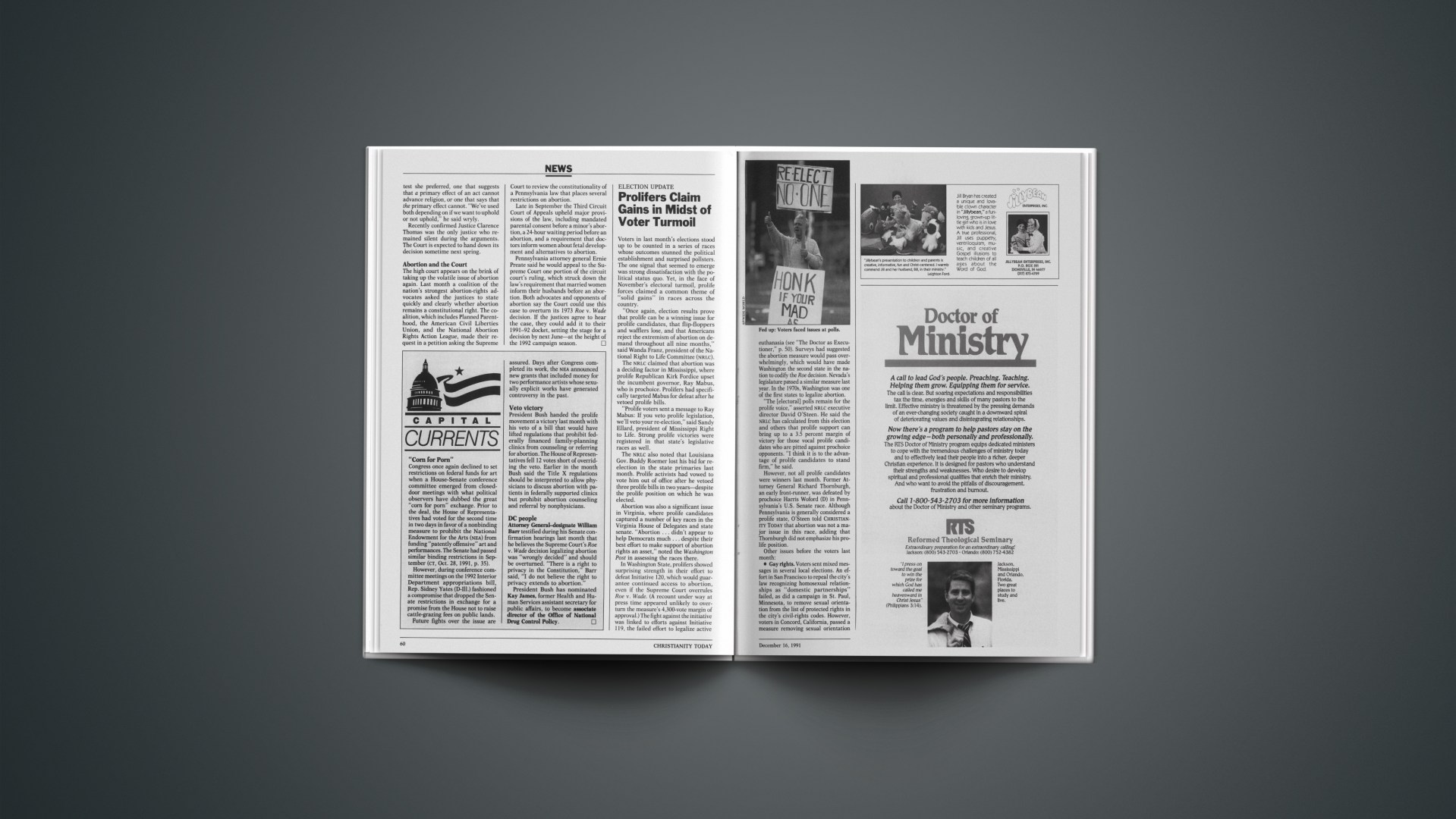Voters in last month’s elections stood up to be counted in a series of races whose outcomes stunned the political establishment and surprised pollsters. The one signal that seemed to emerge was strong dissatisfaction with the political status quo. Yet, in the face of November’s electoral turmoil, prolife forces claimed a common theme of “solid gains” in races across the country.
“Once again, election results prove that prolife can be a winning issue for prolife candidates, that flip-floppers and wafflers lose, and that Americans reject the extremism of abortion on demand throughout all nine months,” said Wanda Franz, president of the National Right to Life Committee (NRLC).
The NRLC claimed that abortion was a deciding factor in Mississippi, where prolife Republican Kirk Fordice upset the incumbent governor, Ray Mabus, who is prochoice. Prolifers had specifically targeted Mabus for defeat after he vetoed prolife bills.
“Prolife voters sent a message to Ray Mabus: If you veto prolife legislation, we’ll veto your re-election,” said Sandy Ellard, president of Mississippi Right to Life. Strong prolife victories were registered in that state’s legislative races as well.
The NRLC also noted that Louisiana Gov. Buddy Roemer lost his bid for re-election in the state primaries last month. Prolife activists had vowed to vote him out of office after he vetoed three prolife bills in two years—despite the prolife position on which he was elected.
Abortion was also a significant issue in Virginia, where prolife candidates captured a number of key races in the Virginia House of Delegates and state senate. “Abortion … didn’t appear to help Democrats much … despite their best effort to make support of abortion rights an asset,” noted the Washington Post in assessing the races there.
In Washington State, prolifers showed surprising strength in their effort to defeat Initiative 120, which would guarantee continued access to abortion, even if the Supreme Court overrules Roe v. Wade. (A recount under way at press time appeared unlikely to overturn the measure’s 4,300-vote margin of approval.) The fight against the initiative was linked to efforts against Initiative 119, the failed effort to legalize active euthanasia (see “The Doctor as Executioner,” p. 50). Surveys had suggested the abortion measure would pass overwhelmingly, which would have made Washington the second state in the nation to codify the Roe decision. Nevada’s legislature passed a similar measure last year. In the 1970s, Washington was one of the first states to legalize abortion.
“The [electoral] polls remain for the prolife voice,” asserted NRLC executive director David O’Steen. He said the NRLC has calculated from this election and others that prolife support can bring up to a 3.5 percent margin of victory for those vocal prolife candidates who are pitted against prochoice opponents. “I think it is to the advantage of prolife candidates to stand firm,” he said.
However, not all prolife candidates were winners last month. Former Attorney General Richard Thornburgh, an early front-runner, was defeated by prochoice Harris Woford (D) in Pennsylvania’s U.S. Senate race. Although Pennsylvania is generally considered a prolife state, O’Steen told CHRISTIANITY TODAY that abortion was not a major issue in this race, adding that Thornburgh did not emphasize his prolife position.
Other issues before the voters last month:
• Gay rights. Voters sent mixed messages in several local elections. An effort in San Francisco to repeal the city’s law recognizing homosexual relationships as “domestic partnerships” failed, as did a campaign in St. Paul, Minnesota, to remove sexual orientation from the list of protected rights in the city’s civil-rights codes. However, voters in Concord, California, passed a measure removing sexual orientation from that city’s antidiscrimination laws. And in Ferndale, Michigan, voters defeated a civil-rights measure that included protection for sexual orientation.
• Drugs. The use of marijuana for medicinal purposes was legalized in San Francisco, where doctors can now prescribe the drug as pain relief for terminally ill patients.
• Lottery. Texans approved the establishment of a state lottery, with the stipulation that at least part of the projected $500 million in proceeds go to education.
• Gun control. Washington, D.C., voters reinstated a law that holds manufacturers and dealers of semiautomatic weapons liable for the crimes committed with their products. Several local churches actively campaigned for the measure.
By Heidi Campbell.
Duke’s Faith Questioned
Personal faith became a political issue in the hotly contested Louisiana gubernatorial race. In a November runoff vote, Democrat Edwin Edwards, the former governor who was twice tried but not convicted on corruption charges, defeated former Ku Klux Klan (KKK) leader David Duke.
Duke attempted to distance himself from past involvement with the KKK and Nazi movements, saying he had become a born-again Christian. Yet during the last weeks of the campaign, the sincerity of Duke’s beliefs came into question. Five days before the election, top Duke campaign official Bob Hawks resigned over the issue, saying that Duke was using Christianity as “a political ploy.”
Meeting with ministers in New Orleans, Lafayette, and Baton Rouge, Duke admitted he did not attend church and could not say exactly when he turned his life to Christ. David Diamond, pastor of the Redeeming Word of Life Church in Baton Rouge, said some Christians were “hoodwinked” by Duke, but that there was never strong evangelical support for him.
Exit polls indicated that 60 percent of weekly churchgoers voted for Edwards, 40 percent for Duke. Self-identified fundamentalists split 50–50 between the candidates, while 62 percent of those indentifying themselves in the general Protestant category voted for Duke.










